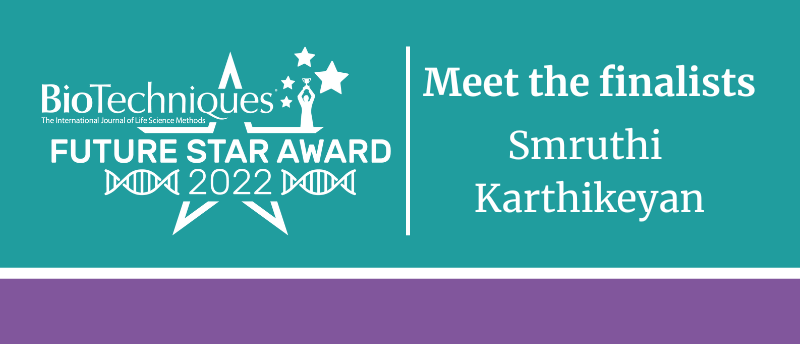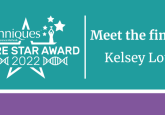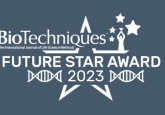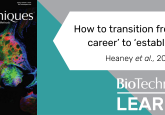Future Star finalist: Smruthi Karthikeyan

This year’s stars for the Future Star Award have been narrowed down to three outstanding finalists. Smruthi Karthikeyan is a postdoctoral researcher at the University of California San Diego (UCSD; CA, USA), developing ways to study microbial dynamics and their effects on human health.
Read more about Smruthi’s career and her aims for the future.
Please tell us about your research career and outreach initiatives to date.
I started graduate school transitioning from a traditional chemical engineering background to the more multi-disciplinary area of environmental engineering. During my PhD under Kostas Konstantinidis at the Georgia Institute of Technology (GA, USA), I was chosen as a GoMRI (Gulf of Mexico Research Initiative) scholar from 2016–2019 to study the environmental impacts of the 2010 Deepwater Horizon oil spill. I worked on developing integrated laboratory and computational biology-based approaches to model, predict and forecast recovery patterns in oil-impacted marine ecosystems. This research earned me the James D. Watkins Student Award for Excellence in Research instituted by the National Academies of Science Engineering and Medicine in 2018.
For my postdoctoral research, I wanted to transition into the microbiome field to apply the skills I obtained during my PhD to study the role of the gut microbiome in human health and disease using high-throughput approaches. I moved to UCSD in March 2020 to take up a postdoctoral position in the School of Medicine under Rob Knight. My move coincided with the beginning of the COVID-19 pandemic as well as the state’s first lockdown. The Knight lab had to quickly pivot towards COVID-19 research to support urgent pandemic response needs, and I led environmental COVID-19 surveillance for the campus. I led the development the first high-throughput, completely automated approach for processing wastewater samples for SARS-CoV-2 detection as a part of UCSD’s campus-wide “Return to Learn (RTL)” program. This method enabled the implementation of one of the largest environmental surveillance programs on the national as well as global level.
In conjunction with the wastewater process pipeline, I also helped develop an automated reporting and notification system covering the on-campus residences of over 10,000 individuals as well as over 5,000 employees during the Fall 2020–2021 academic year. The program involved wastewater monitoring of over 350 UCSD buildings on a daily basis and enabled the early detection of over 85% of infections on campus. This program was instrumental in the safe operation of campus activities during the pandemic.
The success of the program as well as the sample processing automation was covered by over 100 media outlets as the most advanced wastewater surveillance system of its kind. The automated pipeline has successfully been implemented for processing wastewater samples from San Diego County and has also been an integral part of the SASEA (Safer at School Early Alert) project. The SASEA project utilizes wastewater and surface sampling in tandem with diagnostic testing to detect COVID-19 cases in elementary schools and childcare settings. The program was initially piloted in 15 public elementary schools in San Diego County and has more than doubled since.
As a part of the SASEA project, I also taught second to fifth grade classes to schools in the San Diego school district and introduced the students to the world of environmental engineering and microbiology research and explained the science behind the wastewater detections. All of these schools were in areas with high vulnerability index and consisted of a high proportion of refugee and migrant populations, most of whom were first generation students. This experience was particularly rewarding and inspiring in equal measure and allowed me to better understand the barriers facing different groups of people in the pursuit of science.
What made you choose a career in your field?
I’ve always been curious to learn new things. There were a couple of decisions I had to make. One around which major/field to pursue and another on which career path to move towards. After I completed my undergrad in chemical engineering, I was fascinated by the implications of the environment on humans and humans on the environment. I found environmental engineering to be an interdisciplinary field that united science and technology with large future implications.
I was always leaning strongly towards a career in academia because of the impact we can have on future generations through teaching, mentorship and outreach. During the pandemic my first-hand experience of the enormous impact of universities and research labs in pushing the frontiers of science strengthened my resolve to start a career in academia.
I find it both rewarding and satisfying to see that your work can someday help the environment and society in whatever little way it can.
What is the most difficult challenge you have encountered in your work and how did you overcome it?
One of the more challenging aspects of my academic career so far was moving across the country right at the start of the pandemic to start a position in a new lab when the state implemented its first lockdown. It was challenging because most of the existing projects were paused in order to see how our lab could respond to the pandemic, and I was here in a new city without having the chance to meet or talk to any of my lab colleagues in person. All of that changed when I got the opportunity to lead a small effort to set up wastewater monitoring that quickly scaled up in a few days, both in vision and implementation, to one of the largest programs in the country! It was initially a challenging transition, and I had to teach myself some of the new techniques in the lab due to restrictions on occupancy. Being able to contribute in such an unprecedented time of crisis was a motivating factor.
Which publication of yours best highlights your career?
This paper [1] was the culmination of a year’s work with a huge team where we used high-resolution wastewater genome sequencing to uncover early and cryptic transmission of SARS-CoV-2 variants of concern in San Diego. We were able to detect emerging variants of concern (VOCs) in wastewater over 2 weeks prior to the first clinical detection in the county and identify transmission events missed via clinical genomic surveillance. This work informed public health guidance and interventions on the UCSD campus as well as San Diego County in real time, and our data and analyses were disseminated to both public health officials as well as the general public via custom dashboards:
Where do you hope to see yourself and your research in 5 years?
I hope to have successfully built out my lab and lead my research group conducting cutting-edge research in integrating wet-lab and computational biology approaches to study the environmental microbiome and its larger impacts on sustainability and human health.
Why do you feel you deserve this award?
I’m very honored to be considered for this award! The nomination in itself is a great reflection of the work done by me and my various collaborators on important, impactful projects. I hope that my body of work through my early research on oil-eating microbes, creating tools for the research community to share data and more recently leading one of the largest COVID-19 wastewater programs in a critical time (when science stepped up in a big way). Awards are also a source of motivation and could also help motivate the next generation. One of the best parts of my postdoc experience was being able to talk to elementary school students about being a scientist and sharing some of the science we were doing. I think it would be motivating for them to see a rewarding science career.





